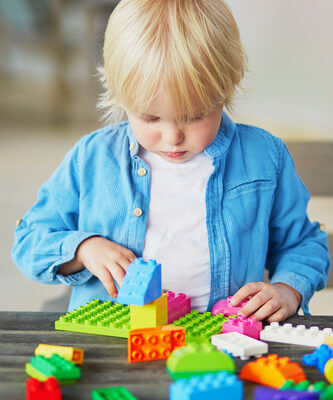15 Toys for Kids with Autism for Sensory Play, Skill-Building and a Whole Lot of Fun

By Marissa Wu for PureWow
Shopping for toys can be tough—you want something that will keep your kid entertained first and foremost, but ideally you’d also like a plaything that will contribute to their development. And for kids with autism, there may be additional considerations that need to be taken into account, as these children often have different developmental, sensory and safety needs. So what toys are best for them? We spoke with two occupational therapists, a behavioral analyst and a parenting educator to get the scoop. Here, they talk about what to look for when shopping and share their top toys for kids with autism that can address sensory, sleep and developmental needs (and are also just really fun to play with).
THE BEST TOYS FOR KIDS WITH AUTISM AT A GLANCE
- Great On-the-Go Toy: Squigz Starter Set ($30)
- Easiest to Clean Up: Kinetic Sand ($15)
- Great for All Ages: Goonidy Pilates Ball ($9)
- Great for Calm and Relaxation: Vivere Cotton Hammock ($70)
- For a Calming Sensory Experience: PLAYABLE Art Ball ($25)
- Most Variety of Experiences: Made by Me Sea Life Sensory Bin ($15)
- Great for Structure and Organization: Play22 Train Set ($22)
- Comforting Bedtime Companion: HUGIMALS Charlie the Puppy ($64)
- Great for Teaching Cause-and-Effect: JOYIN Bubble Machine ($22)
- For Practicing Fine Motor Skills and Coordination: Fat Brain Toys Klickity ($35)
- For Learning About Shapes: Melissa & Doug Shape Sorting Cube ($13)
- To Prepare for a Doctor’s Visit: Melissa & Doug Doctor’s Kit ($35)
- Great for Fidgety Fingers: Dimpl Pops ($25)
- For Encouraging Imagination and Creativity: Melissa & Doug Diner Play Set ($30)
- For Learning Phonetics and Letter Recognition: Alphabet Mystery Box ($60)
Meet the Experts
- Tony Russo is the owner of LifeSpeed: Behavioral Support Services, which provides support to people with developmental disabilities and/or cognitive disorders, including children with autism in the Chicago area. He holds a Master of Arts degree in Applied Behavior Analysis from The Chicago School of Professional Psychology.
- Kate Usher OTD, OTR has been an occupational therapist at Durand School since 2018, with prior clinical experience in a long-term care for medically fragile children, New Jersey’s Early Intervention System and public and specialized school settings. Durand School is a private school in Woodbury, New Jersey, that serves students aged 5 to 21 who experience autism and learning/developmental disabilities.
- Laura Linn Knight is a former elementary school teacher who worked with children with autism. She is the author of the book, Break Free from Reactive Parenting, and a parenting educator.
- Taylor Lauder, MSOT, OTR/L is an occupational therapist at Springtide Child Development, an autism center that provides integrative treatment plans including Applied Behavioral Analysis, speech/occupational therapy and diagnostic services.
What to Look for in Toys for Autistic Kids
When selecting a toy, Lauder says she keeps in mind four things: developmental appropriateness, sensory stimuli, safety and level of interest.
“I usually start with developmental appropriateness, which is different from chronological age, because while most engagement in play assists with development, I want to make sure the child is getting the most out of the toy,” she explains. “For example, if a child’s play and fine motor skills are around the developmental level of an 18-month-old, I would be more likely to suggest toys that have a cause-and-effect component versus a doctor’s play kit which would lean more towards 3- to 4- year-olds.”
Russo notes that sensory toys can provide children who are sensitive to touch with the ability to help them engage with their senses in a manageable way. Good sensory toys will provide kids’ sensory systems with feedback and allow them to self-regulate.
“Every child takes in sensory stimuli differently and some toys may be overwhelming for them (think too loud, too bright, or too many moving parts), or some toys could be overstimulating which can cause disruptions in regulation,” Lauder elaborates.
As for the safety aspect, she also advises keeping in mind the fact that children diagnosed with autism often have a tendency for placing items in their mouth. Thus, it’s best to choose toys that don’t have an abundance of small, individual pieces.
If it feels daunting, don’t panic, says Knight. Shop as you would for any other child—by considering what they enjoy and any skills they need to develop.
“Remember, when you are looking for toys, it’s supposed to be fun,” she says. “You want to look for toys that engage a child with autism in the same way you would look for a toy for a neurotypical child. In fact, many of the toys that you would buy for a neurotypical child, are the same toys that a child with autism would enjoy (blocks, balls, stuffed animals, fidget spinners, cars and trucks).”
How We Chose the Best Toys for Kids with Autism
To select the toys on this list, we asked our experts to recommend items that they have either used with their patients or believe would be good picks, based on their experience working with children with autism.
We then researched each product and considered buyer reviews, age appropriateness and safety, looking for toys that would serve multiple age groups and cater to different needs.
PureWow editors select every item that appears on this page, and the company may earn compensation through affiliate links within the story. You can learn more about that process here at PureWow.

